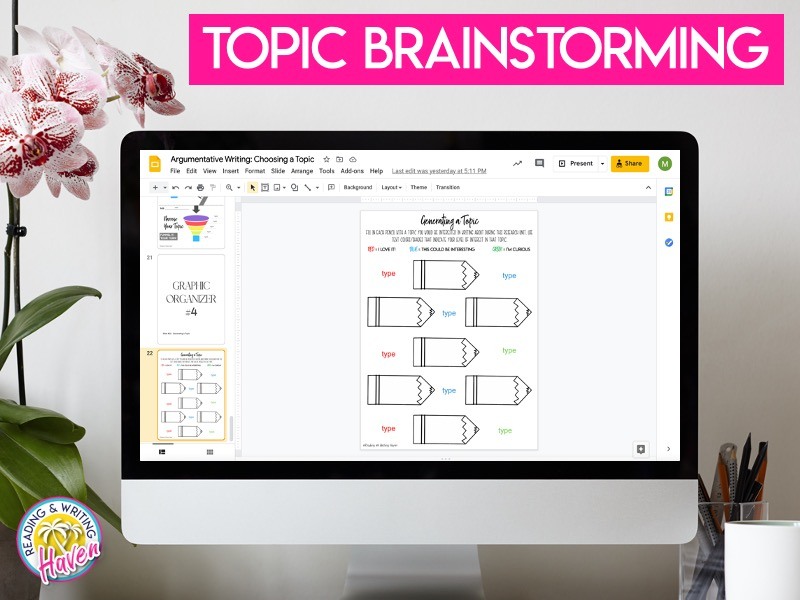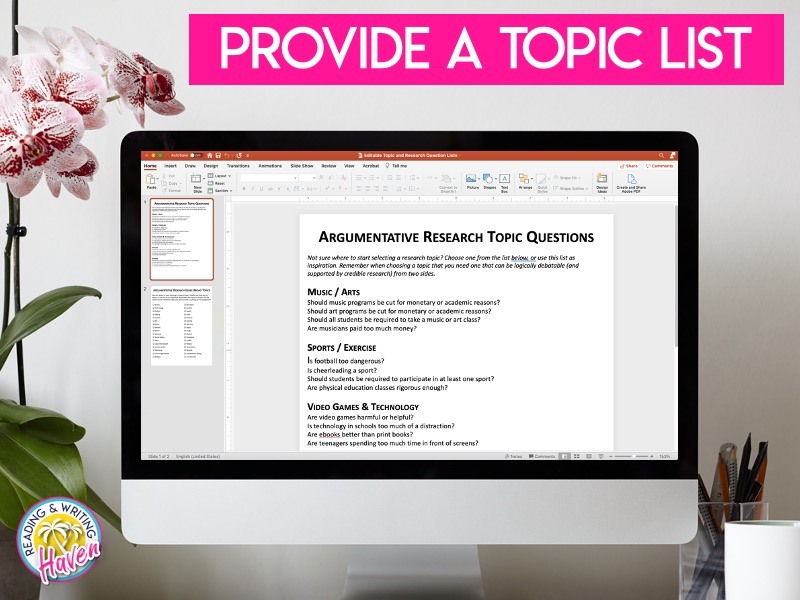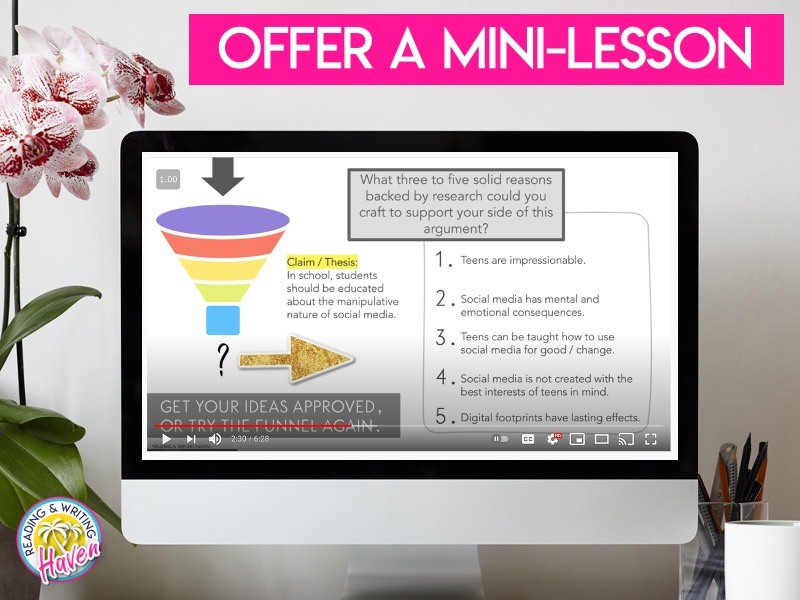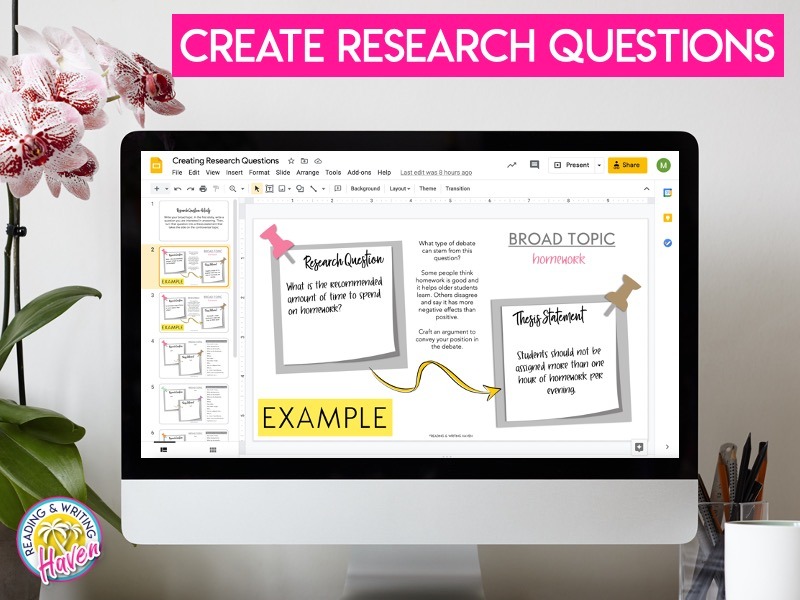How to Help Teens Choose Research Topics for Argumentative Writing
How do you help students choose research topics? I used to approach every class the same way. It only took me one year to figure out that approach didn’t work. Scaffolding the topic selection process is important, but not all students need the same scaffolding. Here are some things to consider when beginning a research paper. These approaches have become my go-to strategies over the years.
If Possible, Give Complete Freedom
Students who are confident writers feel constricted by a list of options. As I teacher, reading over one hundred essays on the exact same topic would just about do me in when it came to grading. What’s more, forcing all students to write about one topic will not showcase their best work. Teens produce better writing when they have creative freedom to pursue their passion. Voice and choice – they matter.
Recently, I’ve seen middle school students, of their own volition, choose to write about inspiring topics, and their essays reflected their interest. For example: Should volunteers be incentivized? Is talent real, or is success based solely on hard work? and Should books be banned from school libraries?
If you are interested in giving your students the opportunity to select their own topic, it’s a good idea to discuss some examples before setting them loose. I like to use The New York Times’ 401 Prompts for Argumentative Writing as a springboard. From there, model webs on the board. Show students how they can narrow down a list of possibilities to one topic that they love (but for which they can also find research).
Once a broad topic is selected, teaching students to funnel their topic and to create guiding questions for research is essential.
Helping Struggling Writers Choose a Topic
Ideally, we want students to choose research topics independently, but not at the expense of having them choose not to write an essay at all. If I notice students who are struggling to narrow down a topic they like, I offer them one for which I know they can find research, like these:
- Should music programs be cut for monetary or academic reasons?
- Are physical education classes rigorous enough?
- Are video games harmful or helpful?
- Is homework beneficial?
In order to cater this list to my students’ interests, I have them fill out a bubble web. On that web, they write down any topics they would be interested in researching. Then, I comb them all for common themes. In doing so, I filter out topics that I know they will struggle with – be it difficulty in finding credible sources or topics that are more complex than they might be ready to handle. This year, many of my students wanted to write about video games (Fortnite), sports, band, music, hunting, and homework. The topics students select each year vary slightly, so tweaking the previous year’s list is always necessary.
When students begin suggesting topics that do not fit the assignment goal or for which I know they will not be able to find credible research, I pull out this list. Other times, I give them the list on Day 1. In this case, I tell them if they are extremely interested in writing about a different topic, they need to get it approved before proceeding. This option satisfies their desire for choice. Interestingly enough, most students just choose I topic I have pre-selected.
When Providing a List is Not Enough…
Some students are overwhelmed paralyzed by choices. These students are not always the reluctant writers in the class. Once you begin talking about the research paper and discussing options, you’ll have a pretty good idea of who needs you to provide them with a topic. I always tell my students that I’d like them to select a topic they are interested in, but if they have difficulty doing so, they have the option to ask for one.
I like to use Scholastic Scope magazine, and they always have topics that are appropriate for secondary level research writing. Middle and high school writers who experience topic paralysis benefit not only from being given a topic, but also from being given sources. I usually have an essay topic on hand as well as two complementary sources. That’s what I give students who aren’t ready to choose their own topic.
The Funnel
Regardless of the approach you take to helping students choose research topics, narrowing the topic from one worthy of an encyclopedia to one worthy of a two page essay can be tricky. I like to teach my students to funnel their ideas.
Confident writers need to understand how to funnel broad topics to more specific angles. From there, they should be able to write a claim or thesis statement and know that it is debatable from two sides. They should also be able to say with certainty that they can find credible research to defend both sides of the argument.
Funneling means they begin with a broad topic, like football. They, they ask questions (often What? When? Why? questions posed by the teacher) to narrow it down to something like the risks of concussions or astroturf.
Crafting Research Questions
The last part of the research topic selection process, I teach students is to craft meaningful research questions. After they find a topic they like, they can begin asking important questions. I use question stems to scaffold this process with middle school students. Often, if we model the process for older students, they do not need the question stems, but I have them on hand just in case.
Students create questions and then reflect on how each type of question might help them with the research process. They also consider what type of thesis statement or claim they could write based on each question. Going through this process helps them to see their topic from a variety of angles. Too often, we rush through the topic selection process, and students don’t see their topic from a birds’ eye view.
The brainstorming stage of the writing process should take time. Choosing a topic and creating a research question are important skills that we shouldn’t rush through. Scaffolding students’ experience during this initial stage of the writing process will give them confidence.
Topic selection can be fun! Allow students to discuss and brainstorm ideas. Model the process for them. Give them time for peer feedback. Most importantly, scaffold the process to meet students where they are. Choosing a research topic that fits the genre of writing expected is the first step to a successful writing experience.
RELATED RESOURCE:
Click on the image below to view the argumentative research paper brainstorming strategies I use to help students select a topic, funnel it, and develop a research question. Help students choose research topics without the frustration.
[sc name=”mailchimp1″]





